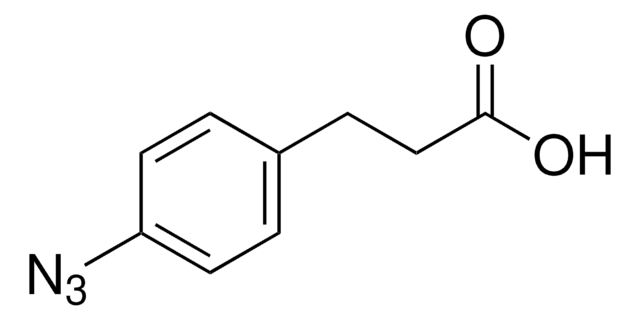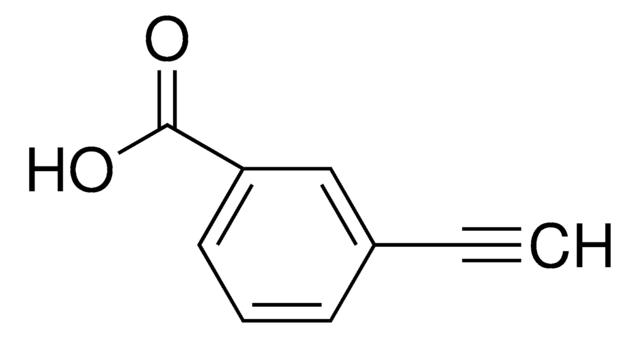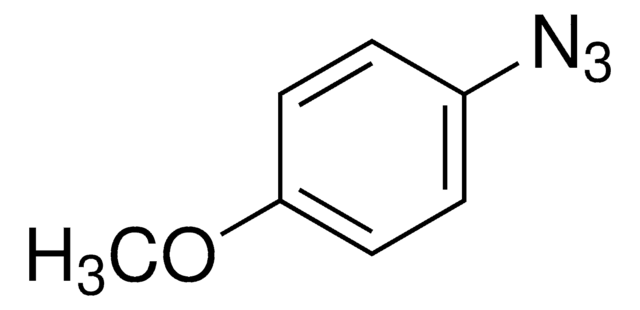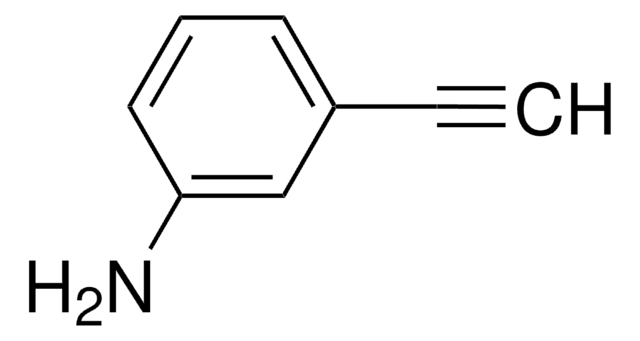778877
4-Azidobenzoic acid solution
~0.2 M in tert-butyl methyl ether, ≥95.0% (HPLC)
Synonym(s):
9-Azidobenzoic acid solution
Sign Into View Organizational & Contract Pricing
All Photos(1)
About This Item
Empirical Formula (Hill Notation):
C7H5N3O2
CAS Number:
Molecular Weight:
163.13
Beilstein:
1950876
MDL number:
UNSPSC Code:
12352106
PubChem Substance ID:
NACRES:
NA.22
Recommended Products
Assay
≥95.0% (HPLC)
form
liquid
concentration
~0.2 M in tert-butyl methyl ether
impurities
≤2.0% water
storage temp.
2-8°C
SMILES string
OC(C1=CC=C(N=[N+]=[N-])C=C1)=O
InChI
1S/C7H5N3O2/c8-10-9-6-3-1-5(2-4-6)7(11)12/h1-4H,(H,11,12)
InChI key
PQXPAFTXDVNANI-UHFFFAOYSA-N
General description
4-Azidobenzoic acid is an aromatic azide generally used in copper(I)-catalyzed azide-alkyne cycloaddition reactions.
Application
Review
Signal Word
Danger
Hazard Statements
Precautionary Statements
Hazard Classifications
Flam. Liq. 2 - Skin Irrit. 2 - STOT RE 2
Target Organs
Blood
Storage Class Code
3 - Flammable liquids
WGK
WGK 3
Certificates of Analysis (COA)
Search for Certificates of Analysis (COA) by entering the products Lot/Batch Number. Lot and Batch Numbers can be found on a product’s label following the words ‘Lot’ or ‘Batch’.
Already Own This Product?
Find documentation for the products that you have recently purchased in the Document Library.
Kai Ling et al.
Journal of biomedical materials research. Part A, 87(1), 52-61 (2007-12-15)
Hydroxypropyl chitosan (HPCS), a water-soluble chitosan derivate, was modified by introducing photoreactive azide groups (4-azidobenzoic acid, Az-) to the amino groups of HPCS, resulting in a photocrosslinkable Az-HPCS. Novel porous chitosan scaffolds thus were fabricated by ultraviolet (UV) light irradiation
Stefan Müller et al.
Journal of materials chemistry. B, 8(3), 416-425 (2019-12-14)
Here, the surface of silicone elastomer was modified with photo-reactive gelatin bearing azidophenyl groups. Two types of gelatin were prepared: one by coupling with azidoaniline and the other by coupling with azidobenzoic acid. The silicone surface was hydrolyzed by oxygen
Lu Sun et al.
Sheng wu yi xue gong cheng xue za zhi = Journal of biomedical engineering = Shengwu yixue gongchengxue zazhi, 23(2), 370-374 (2006-05-19)
Grafting of poly (ethylene glycol) (PEG) on the surface of polysulfone (PSF) sheets by simultaneous or sequential UV irradiation with 4-azidobenzoic acid as the photocoupler was carried out. Water contact angle measurements showed that there was a great improvement of
Bao Li et al.
Regenerative biomaterials, 5(3), 159-166 (2018-06-27)
Photo-reactive poly(vinyl alcohol) (PRPVA) was synthesized by introduction of phenyl azido groups into poly(vinyl alcohol) (PVA) and applied for surface modification. PRPVA was grafted onto cell culture plate surface homogeneously or in a micropattern. Human mesenchymal stem cells (hMSCs) cultured
Aiping Zhu et al.
Biomaterials, 23(23), 4657-4665 (2002-09-27)
Chitosan (CS) was covalently immobilized onto polylactic acid (PLA) film surface using the photosensitive hetero-bifunctional crosslinking reagent, 4-azidobenzoic acid, which was previously bonded to chitosan by reaction between an acid group of the crosslinking reagent and a free amino group
Our team of scientists has experience in all areas of research including Life Science, Material Science, Chemical Synthesis, Chromatography, Analytical and many others.
Contact Technical Service











